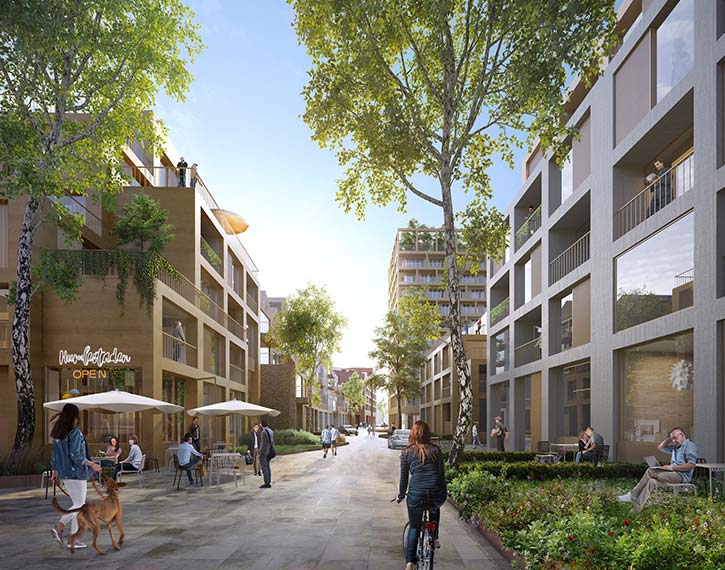What is green leasing in real estate industry
Green leasing is an innovative approach to real estate lease agreements that integrates environmental, social, and governance (ESG) goals into the contractual relationship between landlords and tenants. It’s a collaborative strategy where both parties commit to sustainable practices, such as energy efficiency, waste reduction, and improved indoor air quality. These leases include clauses with respect to operational duties, sustainable practices, and utility tracking, aiming to reduce a building’s carbon footprint and operational costs.
Overall, green leasing in real estate industry aims to foster a partnership between landlords and tenants to achieve long-term sustainability goals, thereby reducing the building’s carbon footprint and operational costs while promoting environmental responsibility.
Green Leasing Clauses & Benefits
Currently, IGBC & LEED are the prominent certifications preferred by the occupiers for Green Buildings, which provide a framework for assessing and certifying the sustainability of buildings. The rating considers various aspects of sustainability, water efficiency, energy efficiency, materials used, indoor environmental quality, innovation in design, etc.
To realise the additional benefits during operational phase, green leasing contracts come into play with clauses pertaining to ESG factors. These leases come in three different shades from Light, medium to dark green clauses.
Light Green: Limited in scope and commitment from both the parties to cover environmental aspects and are not legally abiding
Medium Green: The Scope includes certain obligations on both the parties to cover environmental aspects. But these are not legally abiding.
Dark Green: Legally abiding, require a significant level of commitment and cover a wider scope including environment, social and governance aspects.
Some of the most widely followed green clauses in the country are focused around:
- Energy efficiency: It is a central focus with clauses typically requiring separate metering for energy and water use to encourage conservation.
- Fit-out standards: These are set to ensure that the interiors of the office buildings meet certain environmental criteria.
- Waste management: Waste management and recycling obligations are also common, ensuring that tenants contribute to the building’s overall sustainability goals.
- Transparency: Data sharing between landlords and tenants is another crucial aspect, enabling better tracking and management of resource usage.
- Others: Indoor air quality standards, waste monitoring, and the implementation of green technology are other important elements that are included in these contracts.
In India, the green clauses are still evolving. Currently, they are generally characterized by light to medium green shades, indicating limited commitment and scope. These clauses primarily focus on improving energy efficiency and include certain commitments towards environmental sustainability from both landlords and tenants. This might involve provisions for energy-efficient appliances, waste management practices, and sustainable building materials. However, these commitments are not as stringent or comprehensive as those found in countries with more advanced green building regulations.
Increasing emphasis towards green leasing in real estate industry
The demand for green leasing is being propelled by the increasing emphasis on ESG goals. As companies integrate ESG factors into their decision-making processes, they seek office spaces that align with their sustainability and net-zero carbon targets. This shift is evident with the significant increase in green-certified office penetration.
Key drivers of this demand include Sustainability goals, Corporate Responsibility, Regulatory Compliance, Cost Efficiency etc. This trend towards green leasing reflects a broader commitment to environmental stewardship and highlights the growing importance of sustainable real estate in corporate strategies.
To date, more than 90% of Grade A developer’s commercial assets are green-certified, as demand towards sustainable Commercial (Office) space has increased from the prominent national & international occupiers.
DLF, ITC Group, Lodha Group and the three REITs of Embassy, Mindspace and Brookfield India are some of the leading institutions who have been at the forefront of adopting sustainable practices with green certification in commercial buildings.
Meeting the Demand with Grade A Office Stock
The increase in the adoption of green leases in India is being driven primarily by global initiatives to combat climate change. Owners / Developers are facing mounting pressure to adopt sustainable practices, which is encouraging the inclusion of green clauses in lease agreements. These green leases typically involve commitments to energy efficiency, waste reduction, and other environmentally friendly practices, reflecting a growing awareness and responsibility towards environmental sustainability. This trend aligns with international efforts to reduce carbon footprints and promote eco-friendly practices in the real estate sector.
- The Grade A Green-Certified office stock has increased from 228 Mn. Sq.ft. in 2016 to 418 Mn. Sq.ft. in 2023, indicating an 83% growth over the years and a CAGR of 9%.
- The share of green leasing in real estate industry is quadrupled during the post-pandemic era (2022-2023) compared to pre-COVID years (2016-2019).
- At present, Bangalore, Delhi-NCR, and Mumbai hold the highest share of green leases, accounting for ~68% of the stock.
- Real Estate Investment Trusts (REITs) like Embassy have made green clauses a standard process in their leasing agreements, emerging as leaders in this trend with around 96% of their leases signed in 2023 being green leases.
- Some of the prominent green office buildings in Bangalore include Embassy Tech Village, Bagmane Rio, Novel Info Tech Park, and Prestige Tech Park-IV. Notable tenants in these buildings include Google, Adobe, and other global capability centers (GCCs). The average office space take-up by such companies ranges between 1.0 to 1.5 million square feet.


3 Comments
This is exactly what i was looking for, thank you so much for these tutorials
It would be great to try this theme for my businesses
What a nice article. It keeps me reading more and more!